New Archdeacon appointed and ordained

Following the ordination of Archdeacon James Maskery to the Priesthood, the office of Archdeacon of the British Orthodox Church became vacant, so on Sunday, 6 August Abba Seraphim blessed Deacon Mark Saunders as the new Archdeacon. Abba Seraphim observed, “The choice of Deacon Mark will be very popular because of the high level of affection and respect in which he is held throughout the church and also because of his long service, having been ordained a deacon in February 2000. His commitment and loyalty to the Church has been outstanding and he serves as a role model for future generations.”
Although he recently returned to his home after a long spell in hospital, a small infection resulted in his being re-admitted last week as a precaution and the simple service of ordination actually took place in the hospital when Abba Seraphim and the clergy went straight from the morning Liturgy at St. Felix Church at Babingley, bearing the Reserved Sacrament.
The office of Archdeacon in the British Orthodox Church is unusual in that it has passed to successive holders without interruption for the past forty years, since the appointment by the late Metropolitan Georgius of Father Paulos Lawson-Wood (1906-1990) as the last priest to hold that office. On the occasion of his 80th birthday in 1986 Fr. Paulos named Deacon James Goddard as his coadjutor with right of succession. Archdeacon James Goddard served from 1990 until his death in 1993, in turn naming Deacon Alexander Astill as his coadjutor. He served from 1993-2015 and was succeeded by Archdeacon James Maskery 2015-2017, who in term named Deacon Mark as his coadjutor with right of succession.
We wish Archdeacon Mark: Many Years !
A New Generation of Ministry for the Church
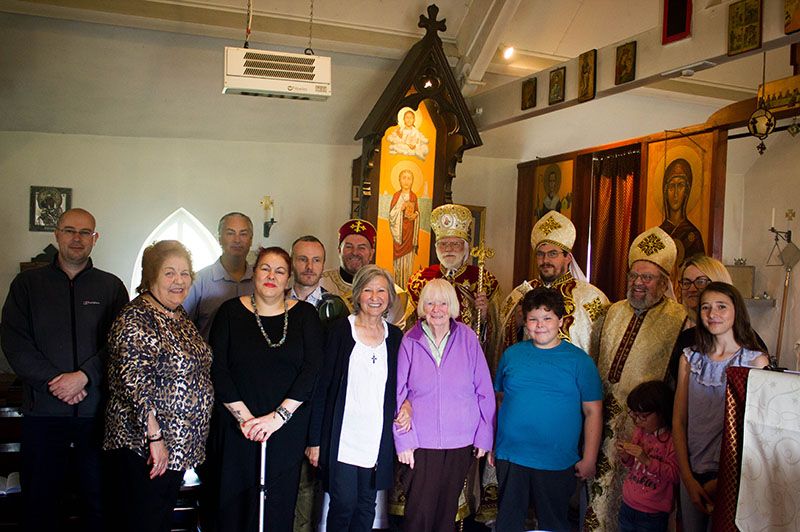
On 30 July 2017, at the Orthodox Church of Saint Mark and Saint Hubert in Cusworth Village, Doncaster, during the Sunday morning Liturgy, Abba Seraphim ordained Subdeacon Athanasius Hall to the diaconate and Archdeacon James Maskery to the Sacred Priesthood.
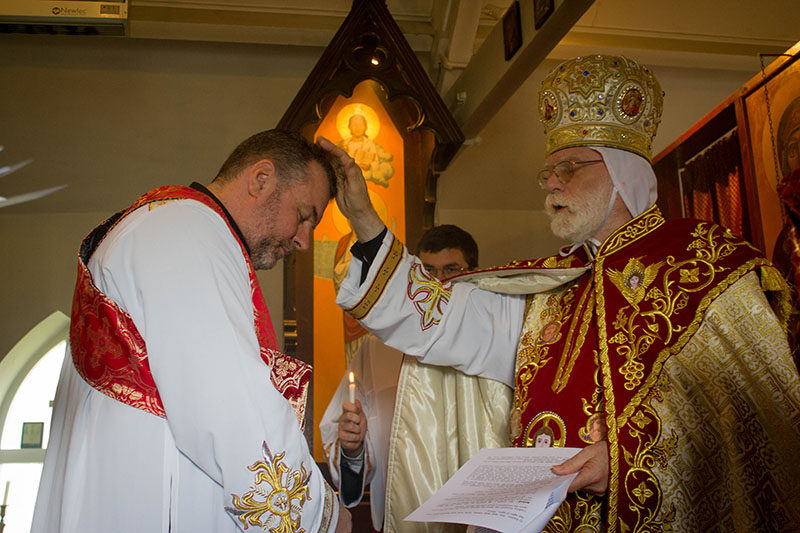
Abba Seraphim noted that by comparison with Father David and himself they represented a new generation of ministry in the church. They will both be attached to the staff of the Church Secretariat, although Father James will also have responsibility for the Charlton Parish. However, they will exercise more than a London-based ministry as they both travel and transport Abba Seraphim to service in other congregations, notably Bournemouth, Chatham and Babingley.
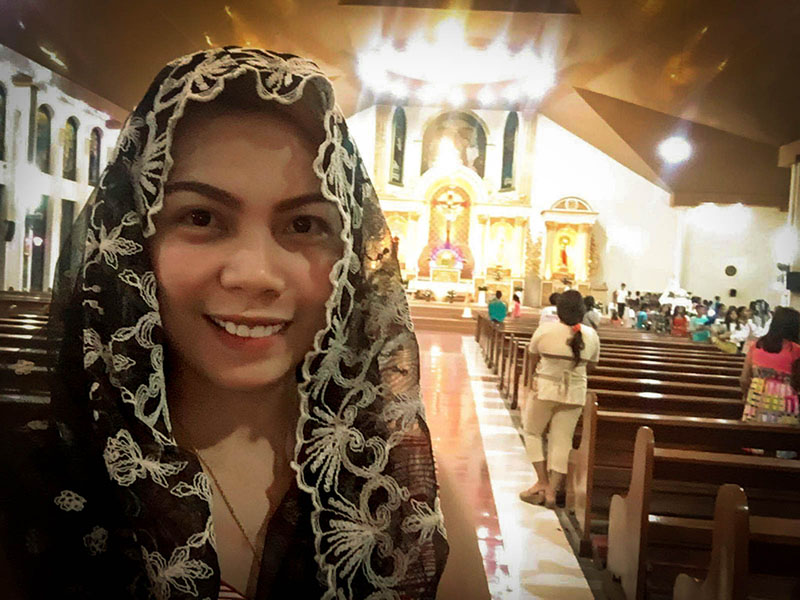
Messages of greeting were received from friends from far away and, in addition to the local Cusworth congregation, some travelled from Sussex, Manchester and mainland China to attend the ordination. Deacon Athanasius’s wife, Rachel, who is currently visiting her family in the Philippines, made a point of attending their local Catholic Church to coincide with the ordinations at Cusworth, so that they could be united in prayer.

Induction of New Rector for Charlton

The news of the appointment of The Revd Elizabeth (Liz) Newman, as Priest-in-Charge of the Charlton United Benefice (St. Thomas & St. Luke) was very welcome news. Not only has the British Orthodox Church worshipped at St. Thomas’s, Old Charlton, since May 1989, but Liz, who has been attached to the Anglican parish as a non-stipendiary priest for many years, so is a well-known and respected member of the local community. As former Chaplain to Blackheath Bluecoats School until its closure in 2014, she served on the staff as the same time as Archdeacon James Maskery. As Abba Seraphim was away from London for her induction at St. Thomas’s on 24 July, Subdeacon Athanasius Hall, represented the British Orthodox Church at the service, which was performed by Dr Woyin Karowei Dorgu, the newly appointed Bishop Suffragan of Woolwich and the Venerable Alastair Cutting, Archdeacon of Lewisham & Greenwich and conveyed greetings on behalf of the Orthodox Parish.
Eritrean Synod organises a Sham ‘Reconciliation’
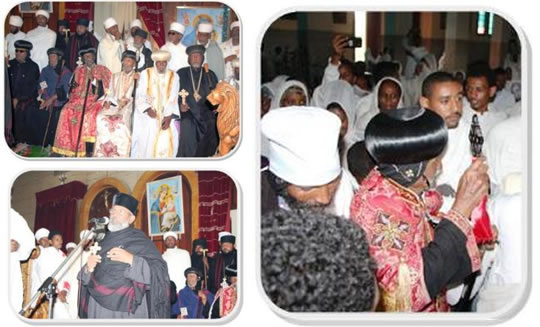
On 11 July 2017 the ‘Holy Synod’ of the Eritrean Orthodox Church issued a statement declaring that the issue of Patriarch Abune Antonios had been resolved and that there was “a full reconciliation, peace and love with Abuna Antonios in the presence of Union of the Monasteries and Church Scholars.” Apart from the fact that the ‘Holy Synod’ ceased to have any credibility as the canonical authority of the Eritrean church at the moment that it concurred in the illegal removal of the Patriarch and supported the usurpation of the government-sponsored anti-patriarch, Dioscoros; the ‘Holy Synod’ is recognised as the mouth-piece of the Eritrean government.
Abune Antonios, now a frail 90 years old, has been kept under house arrest at an undisclosed location since January 2007. He suffers from diabetes and high blood pressure and in May 2017 it was reported that he had fallen gravely ill following having been injected with a harmful substance. It is believed that the Eritrean government is anxious to prepare the ground for his successor, whom many people believe may be Abune Luqas, who was uncanonically consecrated bishop by the late anti-Patriarch Dioscoros, prior to the latter’s death on 21 December 2015. Luqas is the “front man” who appears on official videos making statements on behalf of the church and formal greetings at New Year and other festive occasions. He is believed to be one of the main instigators behind the imprisonment of clergy and recently toured churches in the diaspora to raise his own profile, in what many people believe to be a preparation for his elevation to patriarchal rank. Having the appearance of reconciliation with the legitimate patriarch, Abuna Antonios, would ensure Luqas’s acceptance by other Orthodox churches.
Details of the service of reconciliation are sparse and not derived from any reliable and independent source. Father Bereket of the parish of Adikeyih, another Eritrean priest serving the interests of the government, is said to have read out a letter of apology to Abuna Antonios, who – despite his request – was not allowed to pray for those assembled or to make any public address on this occasion, whilst photographs of the event were blurry and restricted. The presence of plain-clothes security officers, pushing people out of the church compound, clearly revealed who was in charge of this sham reconciliation. Afterwards, Abuna Antonios was returned to house arrest. This cynical attempt at manipulation of this frail, but holy hierarch, is symptomatic of the ongoing persecution of Eritrean Christians; but we thank God that there are those in Eritrea who are not unaware of government strategy, whilst international organisations like CSW (Christian Solidarity Worldwide) which have been vocal supporters of Abune Antonios and persecuted Christians in Eritrea, have exposed this contrived attempt to conceal the reality of the ongoing persecution of the Eritrean Church. No statements by the “Holy Synod” can be regarded as dependable and unless events can be corroborated by a reliable and independent source, such as the Coptic Orthodox Patriarchate, they are of little value.
The British Orthodox Church continues to pray for Abuna Antonios and all those righteous bishops, priests, monks and faithful who stand for truth and justice against a cruel and oppressive régime.
Abba Seraphim’s ‘Ruby’ Anniversary
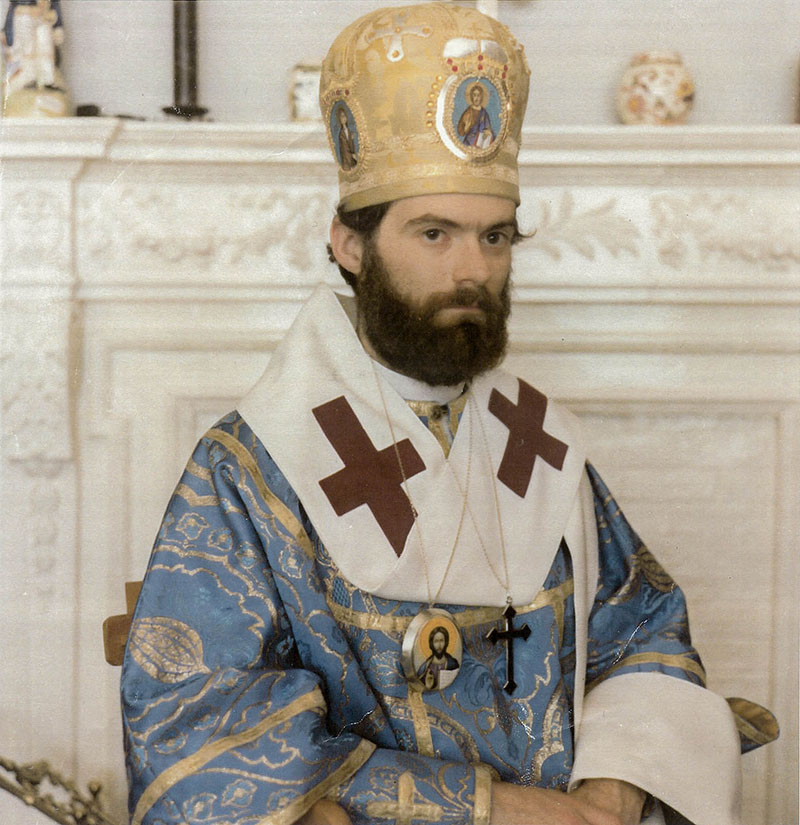
Sunday, 9 July was the fortieth anniversary of Abba Seraphim’s episcopal consecration, which took place at Blackheath in 1977. There was no special festivity planned, as Abba Seraphim felt it was more important for him to meet his regular Sunday obligations, rather than disrupt them for a celebration, but a special Thanksgiving Prayer was offered during the Divine Liturgy, which he celebrated at St. Alban’s Orthodox Church in Chatham, as well as prayers commemorating his late consecrators: Metropolitan Georgius of Glastonbury, Bishop Ignatius Peter of Priddy and Archbishop Iltud of Dol. Abba Seraphim was touched to receive many affectionate greetings and assurances of prayers from the British Isles as well as around the world and, after leaving Church, he and the other clergy were entertained to lunch nearby at the home of one of the Chatham congregation. Later, in the evening he and Archdeacon James were entertained to dinner by a long-standing friend of the Church. The attached pictures of four decades ago were located in the extensive British Orthodox church archives; whilst a special YouTube compilation of photos was posted online as a tribute by Egyptian friends of the British Orthodox Church.

